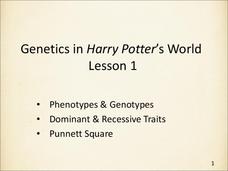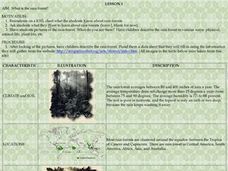Chicago Botanic Garden
Recognizing Change (Observation vs. Inference)
What is the difference between making inferences and making observations? Young climatologists refer to a PowerPoint to make observations on each slide. They record their observations in a provided worksheet before drawing a...
Curated OER
Unit II: Worksheet 3 - Velocity
Future engineers analyze the motion of Robin, the roller skater, as he moves along a sidewalk. They graph the position versus time for three different occurrences. Questions are asked about the resulting graphs, reinforcing the concepts...
Teach Engineering
What's Wrong with the Coordinates at the North Pole?
Here is an activity that merges technology with life skills as individuals use Google Earth to explore the differences between coordinate systems and map projections. The self-guided activity is the fourth segment in a nine-part unit....
K12 Reader
What’s in Your Cells?
Organelles, cellular respiration, ATP, and DNA. The passage attached to this life science reading comprehension worksheet is all about cells. After reading about diffusion and osmosis, kids answer a series of questions based on the text.
Curated OER
Seasons Worksheet #1
First, your earth science pupils determine what season is depicted in a diagram of the tilted Earth as it receives radiation from the sun. They answer multiple choice questions about occurrences at different points on Earth in the...
US National Library of Medicine
Genetics in Harry Potter’s World Lesson 1
By the end of Harry Potter and the Deathly Hallows, we know Harry and Ginny get married, but what will their kids look like? This presentation introduces viewers to Punnett Squares and how to use them to determine both...
Curated OER
Worksheet 3: Earth's Climate System II
A diagram of a mountain range and the prevailing winds is shown at the top of the page. Meteorology pupils describe the weather conditions at different points on the diagram. They explain the El Nino effect and why evaporation and...
Curated OER
Unit II Worksheet 4 - Constant Velocity/Motion Maps
This is a smart approach to displacement concepts. Physics learners analyze a motion map and then draw qualitative graphs for time versus displacement and time versus velocity. Get your class thinking critically through the use of a very...
Mr. Waynes clas
Kinematics Objectives
Accelerate young physicists' learning with this collection of problem-solving worksheets. Starting off by teaching students to identify the given information and variables in physics problems, this resource goes on to challenge them...
Curriculum Corner
Hibernation
What is hibernation? Which animals hibernate and which don't? A 40-page packet on hibernation includes graphic organizers, reading passages and pictures about animals that hibernate, task cards, templates for a hibernation booklet,...
Wind Wise Education
Understanding Forms and Sources of Energy
What is the difference between a form of energy and a source of energy? This first activity in a series of 19 lessons uses demonstrations and discussions to introduce energy to the class. Through using hand-generator flashlights,...
Curated OER
Integers and Science Worksheet.
In this science worksheet, students incorporate their knowledge of math to solve the given problems about freezing points through conversions. They convert from unit to the other. There are 10 questions.
Curated OER
What is Energy?
In this potential and kinetic energy learning exercise, students will learn how potential energy and kinetic energy are used to make a roller coaster go. Then students will complete 2 short answer questions based on what they read.
Curated OER
What is Work?
In this work worksheet, students will match vocabulary words with definitions: joule, Newton, force, and work. Then students will answer 8 problems based on the equation: work = force x distance.
Curated OER
What is an Animal?
In this flatworm body plan worksheet, students compare the body plans of several worms. Students answer several questions based upon the given diagrams of a cross section of the different body plans of each worm.
Curated OER
What is a Magnet?
In this magnet worksheet, students will write a main idea describing what is a magnet. Then students will write in four supporting details for their main idea.
Curated OER
"What is an Engineer?"
Students describe and draw what an engineer looks like and does. They descrie what they think an engineer does. Students volunteer to read their description to the class. They use their knowledge as well as their classmate;s...
Curated OER
What Is Life?
For this life characteristics worksheet, students answer 16 questions about living things, Redi's experiment, basic needs, growth and development.
Curated OER
What is Sand?
Learners complete a sand analysis project. In this sand grains lesson, students learn background information on how sand is formed and what sand grains are made of. Learners are given bags of sand and use them to complete a...
Curated OER
What is a Fossil?
For this fossils worksheet, students are given a bag of fossils mixed with non- fossils. They are to determine which category each item belongs to and give a reason. They answer questions about how they determine fossils from non-fossils.
Curated OER
Radioactivity-What is the Nucleus Like?
In this radioactivity worksheet, students answer 40 questions about half life, isotopes, radioactive decay, the uses of radioactivity, nuclear equations and the scientists associated with radioactivity.
Curated OER
What is the Nucleus Like?
In this nucleus of an atom worksheet, students answer 19 multiple choice questions about the structure of the atom, radioactive decay, isotopes and half life.
Curated OER
What is the Rainforest?
Students investigate rainforests. In this rainforest lesson, students brainstorm on a KWL chart about what they already know about the rain forest. Students are shown pictures of the rain forest and describe what they see in the photos....
Curated OER
What is an Ahupua'a?
Learners research ahupua'a ecosystems. In this ahupua'a lesson, students explore how land is subdivided in Hawaii and the effect on the ecosystem. Resources are provided.























